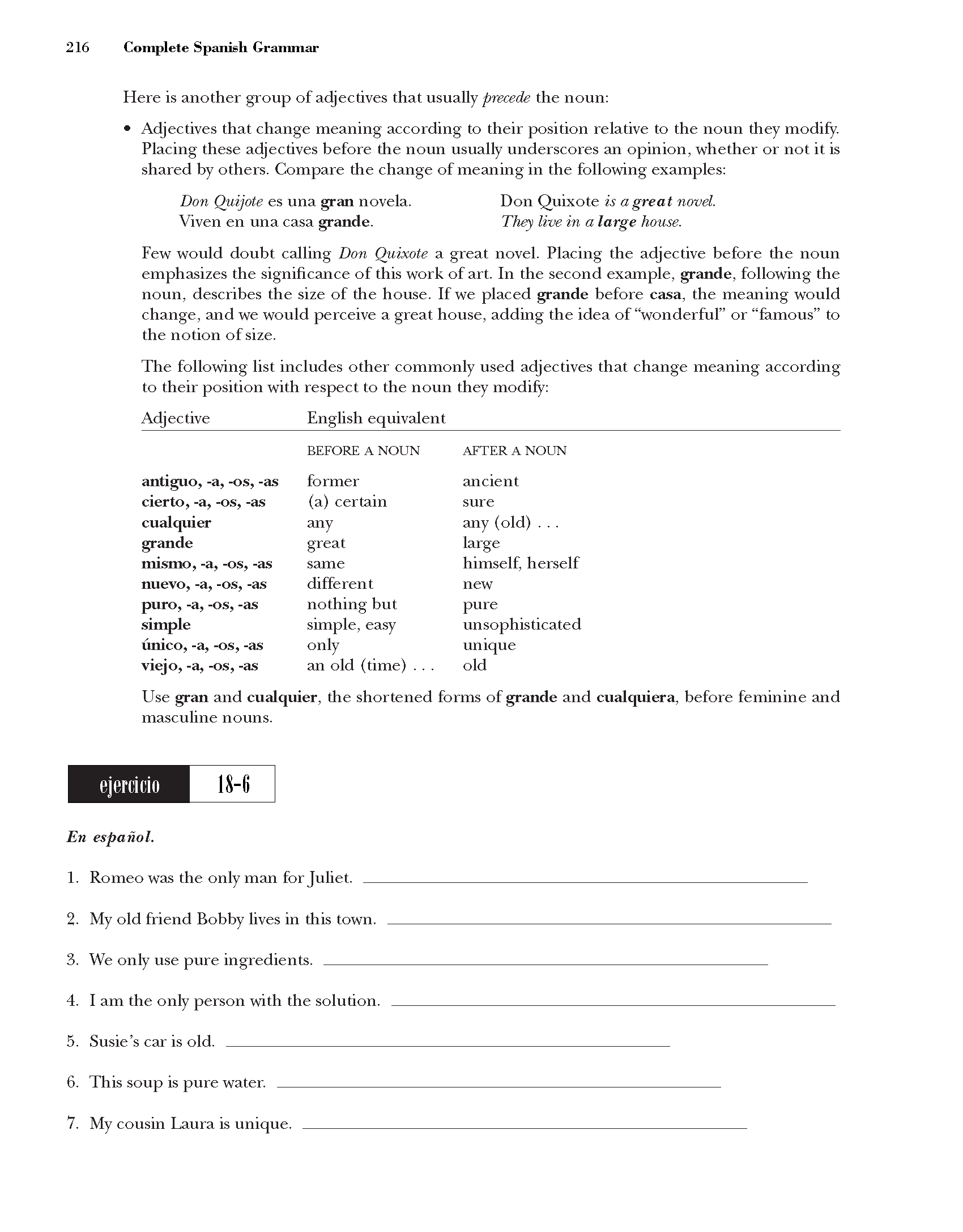CSG227

216 Complete Spanish Grammar
Here is another group of adjectives that usually precede the noun:
• Adjectives that change meaning according to their position relative to the noun they modify. Placing these adjectives before the noun usually underscores an opinion, whether or not it is shared by others. Gompare the change of meaning in the following examples:
Don Quijote es una gran novela. Don Quixote is a great novel.
Viven en una casa grandę. They live in a large house.
Few would doubt calling Don Quixote a great novel. Placing the adjective before the noun emphasizes the significance of this work of art. In the second example, grandę, following the noun, describes the size of the house. If we placed grandę before casa, the meaning would change, and we would perceive a great house, adding the idea of “wonderful” or “famous” to the notion of size.
The following list includes other commonly used adjectives that change meaning according to their position with respect to the noun they modify:
Adjective English equivalent
|
BEFORE A NOUN |
AETER A NOUN | |
|
antiguo, -a, -os, -as |
former |
ancient |
|
cierto, -a, -os, -as |
(a) certain |
surę |
|
cualquier |
any |
any (old) . . . |
|
grandę |
great |
large |
|
mismo, -a, -os, -as |
same |
himself, herself |
|
nuevo, -a, -os, -as |
different |
new |
|
puro, -a, -os, -as |
nothing but |
pure |
|
simple |
simple, easy |
unsophisticated |
|
linico, -a, -os, -as |
only |
unique |
|
viejo, -a, -os, -as |
an old (time) . . . |
old |
Use gran and cualquier, the shortened forms of grandę and cualquiera, before feminine and masculine nouns.
ejercicio
En espańol.
1. Romeo was the only man for Julie t. _
2. My old friend Bobby lives in this town.
3. We only use pure ingredients. _
4. I am the only person with the solution.
5. Susie ’s car is old. _
6. This soup is pure water. _
7. My cousin Laura is unique. _
Wyszukiwarka
Podobne podstrony:
image002 UNUERSE2 HERE IS ANOTHER COLLECTION OF NEVER-BEFORE-PUB-LISHED SCIENCE FICTION STORIES WRIT
CSG093 82 Complete Spanish Grammar Yo mismo(a) escogi el nu mero I my s elf chose
DSC09971 Here is another example of an acute meningitis from bacterial infection. The cerebrospinal
CSG309 298 Complete Spanish GrammarOther ]egative Expres$ions Some of the words you have studied in
CSG327 316 Complete Spanish Grammarejercicio Escribe en espańol. 1. Va of the popu
P5140085 Lymphedema of Lower Leg Lymphedema of the lower extremity is thc result of edema that forms
CSG039 28 Complete Spanish Grammar Let’s start with a key distinction: ser is used to describe perma
CSG067 56 Complete Spanish Grammar The imperfect is also used to express the past: • &nb
CSG107 96 Complete Spanish Grammar Remember that -er and -ir verbs have the same ending. The bus is
więcej podobnych podstron